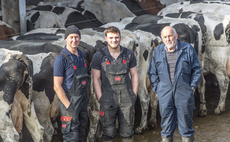
Improving the fertility of your herd through prompt and effective treatment of clinical mastitis cases sounds quite farfetched, but hold on to your notepad while I explain, says Dr Jude Roberts, veterinary consultant at Map of Ag.
She says: "Mastitis cases are common and cause significant losses, including lost milk production, treatment costs and discarded milk.
"As we all battle for a fair milk price alongside the added extra costs of living, each and every case of mastitis we treat effectively can make a difference."
For an individual cow, the condition is painful due to the inflammation in the udder. There are also negative effects from the reduced feed intake, which impacts the cow's productivity when she has been affected.
Dr Roberts adds: "We know from research that the addition of non-steroidal anti-inflammatory drugs [NSAIDs], such as Metacam®, to mastitis treatment protocols can have significant benefits on the cure rate and outcomes of a case."
The use of an NSAID, such as Metacam®, has benefits for all types and severities of mastitis, with many farmers now including it in their treatment protocol for all cases.
Dr Roberts says: "Evidence now shows us that these benefits extend also to improving fertility parameters when mild and moderate cases are given an NSAID as part of their treatment."
Cows treated with Metacam® alongside their intramammary antibiotic had higher conception rates and fewer serves per pregnancy than those which had not received it. This means that the addition of Metacam® to treat mastitis improved pregnancy rates and therefore the overall fertility of the herd.
About mastitis
- Mastitis is inflammation of the udder and is a painful condition with detrimental effects on the body
- The use of an NSAID, such as Metacam®, improves the outcome of clinical mastitis treatment as well as the cow's fertility.
Take the pledge
Get involved and highlight the great steps the UK cattle industry has taken towards reducing pain and discomfort in cows and calves on UK farms. For more information, visit
*Terms and conditions apply.
Reference: 1. McDougall et al (2016) J. Dairy Sci. 99 (3): 2026-2024
Metacam® 20 mg/ml solution for injection for cattle, pigs and horses contains meloxicam. UK: POM-V. Advice should be sought from the prescriber. Further information available in the SPC or from Boehringer Ingelheim Animal Health UK, RG12 8YS, UK. Tel: 01344 746 957. Email: [email protected]. Metacam® is a registered trademark of Boehringer Ingelheim Vetmedica GmbH, used under licence. ©2023 Boehringer Ingelheim Animal Health UK. All rights reserved. Date of preparation: BOV-0057-2023. Use medicines responsibly
This post is funded by Metacam.
























